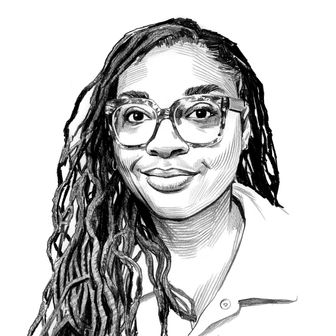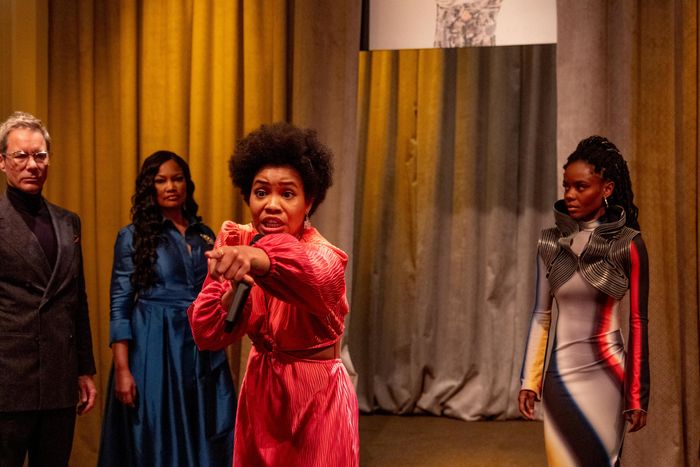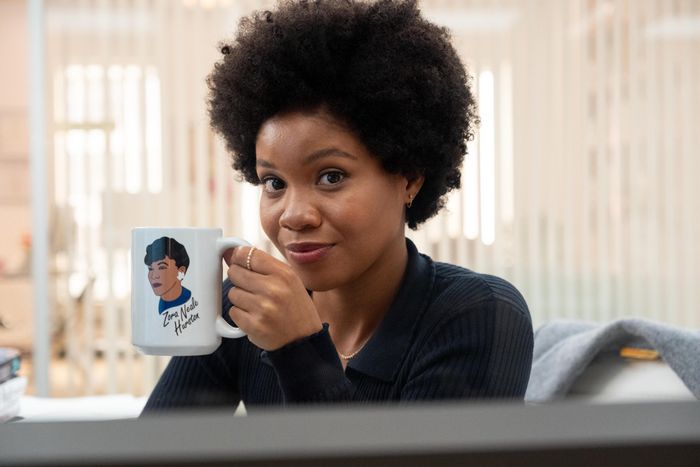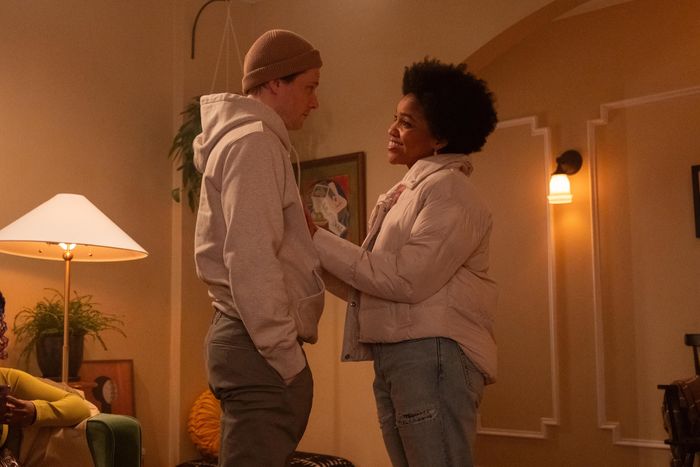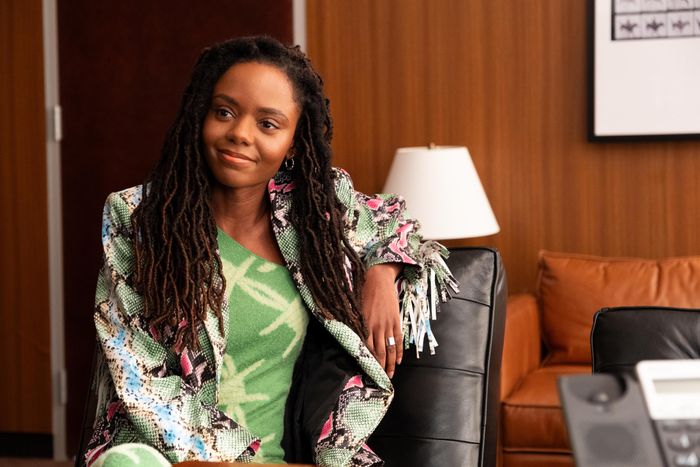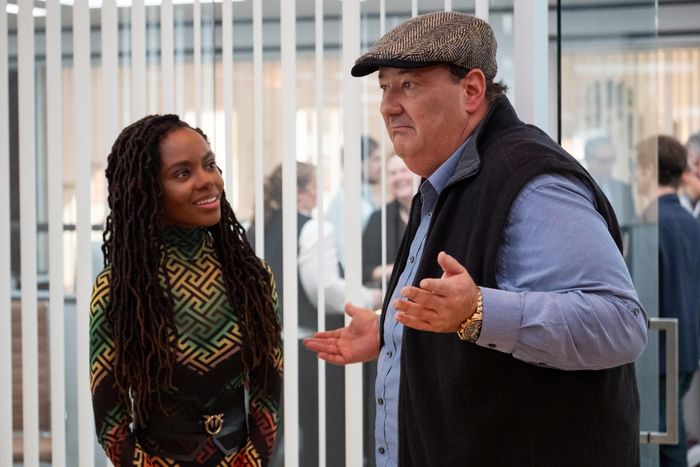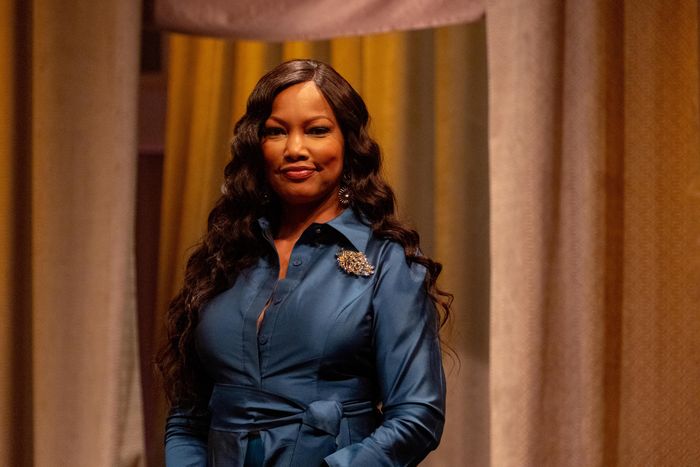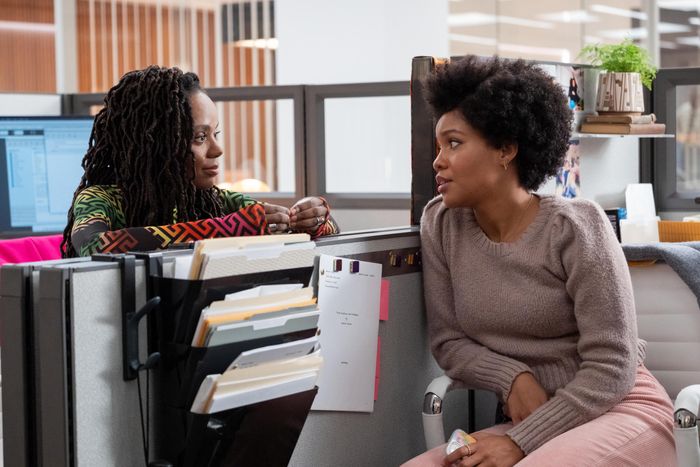
The TV adaptation of The Other Black Girl debuted on Hulu with a built-in audience of curious readers waiting to see how it would compare to Zakiya Dalila Harris’s best-selling debut novel. The book’s commercial success primed the series for attention, but also for scrutiny, particularly from Black readers who wondered if we read the same book everyone was talking about: Was Harris writing for us or for a white audience? Dig past the glowing reviews — many from non-Black critics — and you’ll find a slew of Black readers who had trouble making sense of this story.
On the surface, the concept is intriguing: Nella, the book’s protagonist, is the only Black employee at the fictional publishing company Wagner Books until Hazel, the eponymous “Other Black Girl,” shows up at the office and leads Nella down a disturbing path that changes her career forever. The novel is marketed as a satirical thriller in the vein of Get Out, with Harris poking fun at socially unaware white professionals within a suspenseful workplace mystery. But amid nuggets of superb writing, Harris leaves a ton of unanswered questions and strange plot twists, the most polarizing of which is the book’s ending.
That ending looks different in Hulu’s version of The Other Black Girl, which shares some of its predecessor’s struggle to find the right balance between satire and thriller but also showcases how adaptations can refine the source material. Harris herself was involved in the process of turning her book into a series, and she used it as a chance to fill in some blanks: The story benefits from the adaptation process, making changes that create new opportunities for interpretation and thoughtfulness. Here are six such changes that make The Other Black Girl read better onscreen.
This article contains major spoilers for both the book and screen versions of The Other Black Girl.
An Open Ending
While it might be less of an intentional creative change than a strategy for securing a second season, the Hulu series’ open ending gives The Other Black Girl space to rethink the book’s final twist: Hazel is part of a secret society of Black women called OBGs, as in “other Black girls.” This women in this society, co-masterminded by a famous Black woman author named Diana Gordon — Nella’s hero and the reason she works at Wagner — use magical hair grease that allows them to ditch the dissonance and moral compromise that come with constant code-switching, making them compliant and easier for white people to work with. Nella not only agrees to use it, but becomes complicit in getting others to use it as well, an unsatisfying ending that lacks explanation for anyone’s motives other than allowing Black women to gain professional success without ruffling white feathers.
Black women’s hair is a slippery trope, one that too often reduces the complicated, personal relationship we have with our hair to commentary about whiteness. It’s a nuanced concept that could be handled with humor — “magical hair grease” sounds like something straight out of Atlanta or A Black Lady Sketch Show — but one where the book struggles to find the right balance of satire and seriousness, the most glaring of many missed opportunities for honest discourse on respectability politics and what success looks like to Black people.
The television adaptation, however, adds an enticing wrinkle to this ending: the possibility of a rebel takeover. In the season finale, after being forced into choosing to give up her place at Wagner or use the hair grease and become allies with the devious Diana, Nella shows up to the office with a pin-straight buss-down weave and a new attitude, ready to accept everything about Wagner she had an issue with. It appears Nella’s become what she refers to as one of Diana’s “pod people,” and her transformation surprises even Hazel. But the season ends with Nella in her new office making a phone call where she says, “I’m in, let’s burn it down,” suggesting the possibility of a sophomore season that would see her become a vigilante instead of a cog in the system.
Recharacterizing Nella
Book Nella is dealing with alarming levels of internalized anti-Blackness that make her a difficult character to sympathize with. Whiteness is central to her characterization — her hometown, college, and profession are all predominantly white — and she easily falls into the trap of “othering” herself, using whiteness as a reference point to make sense of her Blackness. A lot of the commentary within Nella’s stream of consciousness is eyebrow-raising, like when she benignly refers to herself as an “Oreo,” and some of her observations about Hazel are incredibly racist, such as her curiously wondering whether Hazel ever received a note from HR about the “odor” of her dreadlocks. At one point, while venting to a friend, Nella says that “racist” is white people’s “N-word,” a statement that’s bizarre to imagine a Black woman thinking, much less speaking aloud.
In the series, Nella’s character seems to have a better understanding of her own Blackness and isn’t as bothered by Hazel unapologetically using AAVE in the office or exposing her co-workers to Harlem culture. There are still moments where it’s apparent that whiteness remains at the center of her life, like when Nella sees Hazel’s eccentric, fashion-forward work attire and scoffs, “Old people work here,” showcasing how Nella sticks to the status quo. But the Nella of the show isn’t self-deprecating about her Blackness (the word Oreo is thankfully omitted), which is another reason the ending works better, and Sinclair Daniel’s performance as a woman tip-toeing the line between authenticity and respectability helps make this character easier to relate to, and perhaps even root for.
Making Owen More Likable
Nella’s boyfriend, Owen, also receives an incredible rebrand in the television adaptation. The book offers an emphasis on Owen’s whiteness and little examination of why Nella would be so attracted to a man who minimizes the microaggressions she endures at work, comparing her feelings of alienation at her job to being the only straight guy at brunch. In that same scene, Owen asks Nella to admit that she “sort of liked being the only Black girl at Wagner,” which is indicative of both Owen’s ignorance and the subconscious effects of anti-Blackness on Nella, who can recognize and dislike her co-workers’ racism, but not enough to see how it’s penetrated her own consciousness. Other than her own internalized anti-Blackness, it’s confusing that Nella would be in a committed relationship with someone who acts similarly to the white people at the office who she disdains.
Thankfully, Hunter Parrish is saved from some cringey line deliveries by Harris, who wanted to expand the Owen we see onscreen. The author told USA Today that she “didn’t want to necessarily focus on [Owen] or establishing him as much” in the novel, and for the show recalibrated Parrish’s Owen as a kinder and more well-meaning version of a white partner in an interracial relationship. When Nella complains about the microaggressions she’s experiencing in the office, he’s supportive of her feelings without centering himself, showering her with affection even when he can’t solve her problems. In most of his scenes, he’s a safe haven where Nella can escape having to prove her Blackness, instead of another person she has to explain herself to.
Hazel Becomes Whole
Hazel-May McCall is an integral part of The Other Black Girl, and Ashleigh Murray’s performance is arguably the best part of the series. That’s in contrast to the book, where Hazel is mostly meant to move the plot as an antagonist and sometimes-foil to Nella, representing an expression of Blackness drastically different than what Nella is comfortable with. Once it’s revealed that Hazel was operating under an alias and everything we knew about her was a facade, it’s impossible to know what bits of her personality are real and which are fake.
The Hazel of the television show is no longer a glorified literary device; she’s given a backstory and motivation that allow the show to pose questions more directly than the book. Showing us Hazel taking care of a disabled mother and being discriminated against for not having a college degree complicates our ability to view her as strictly a villain, and engages with the sort of thorny complexities the book often glanced over. What does “selling out” mean to a person who comes from nothing? Is it easier to abide by white rules than to suffer in poverty? To what lengths will someone go to free themselves? Giving viewers an opportunity to empathize with Hazel makes her and everything she represents infinitely more compelling.
Leaning Into Satire
Dry humor can be hard to execute via the written word, especially when dealing with topics like microaggressions in the workplace: Being the only Black person in a situation can lead to absurd predicaments, sure, but it’s not a fun position to be in. For readers acutely attuned to being in this position, when the humor isn’t expressed sharply it can land with a thud. But hearing that humor performed aloud and on screen, distancing viewers from the voice inside their head, gives these statements a satirical edge that was often dulled in the book. Thanks to superb comedic timing from Bellamy Young, who plays Nella’s boss Vera, Alyshia Ochse, who plays Hazel’s boss Maisy, and Kate Owens, who plays their co-worker Sophie, The Other Black Girl’s workplace satire snaps into focus. Their impeccable line deliveries, from Vera yelling, “Diversity matters!” to Maisy wondering under her breath who Lil Baby is, highlights how ludicrous ignorant white comments can be, no matter how innocent the intent. Brian Baumgartner from The Office makes an appearance as a best-selling Wagner author who’s been canceled for a racist character in one of his books, and his obtuse uttering of the phrase “I don’t even see colors, I see characters” is the type of addition that helps make the show’s satirical elements as strong as its suspenseful ones.
The Diana of It All
Perhaps the biggest divergence from the source material is that the series brings Nella face to face with Diana Gordon, the Black woman author of a book published by Wagner in the ’80s that was edited by Wagner’s only Black editor and Diana’s best friend, Kendra-Rae. After Kendra-Rae did a scathing interview about how racist the publishing industry is, she became the first victim of the hair grease, which Diana used on her friend as damage control. She and Richard Wagner, the founder of Wagner Books, then team up as part of an organized scheme to convert professional Black women into OBGs.
Diana’s characterization in the book leaves us wondering: what is her end goal? Maybe assimilation is enough for her — at one point, she cringes at “Black” names like “Quinnasha,” “Rayquelle,” and “Kasselia” (which all sound more to me like a white person making fun of Black people than uniquely Black names), thinking to herself, “My goodness. We people keep naming our kids these names, and yet we still wonder why we’re not getting any of the jobs?” The book establishes Diana’s motivation as wanting to numb the “waves of racism” Black women experience, but it snowballs into a nefarious plot that puts them in positions of power only when they’re amenable to white people, making Diana the personification of The Other Black Girl’s confused presentation of internalized anti-Blackness.
Like Nella and Owen, Diana gets a revamp in the adaptation in the hands of Garcelle Beauvais. As with Hazel, her character gets more well-rounded, and the season finale provides a more direct motivation for Diana: She wants to use the hair grease to create a “spokesperson” for a book that will “change the way Black people feel about ourselves.” This book has already been ghostwritten as a collaboration between Diana and other members of her hair-grease sisterhood, and she intends to brainwash a progressive Black podcaster to use as her puppet author, telling Nella that this is only the first step to gaining control of the whole industry.
Here, Diana becomes a stand-in for Black professionals who may have compromised themselves for the promise of success and are encouraging the next generation to do the same, leading to friction between the old guard and the new. It’s an iteration of the novel character that humanizes her without losing any of the menace she represents (and which Beauvais portrays beautifully). Getting to see Nella meet her hero and realize that not all skin-folk are kinfolk echoes a very real experience for many young Black professionals, and makes the idea that Nella might be the one to take down Diana’s hair-grease scheme from inside all the more enticing.
As with all of these variations between book and screen, reimagining the character of Diana allows the show to grapple with questions that weren’t fully dissected in the book: Is seeing Black faces living white lives the pinnacle of success? What is success if you must leave behind a part of your identity? Within the cult of capitalism, does making it to the top represent freedom or an even bigger cage? As a book, The Other Black Girl only brushed the surface of such questions, and the Hulu series’ ten episodes dig only slightly deeper. But they also allow Harris and her co-writers to engage with and address some of the book criticisms, and in the process lay the groundwork for a possible continuation of this story that more fully excavates both the system and our place in it as successful Black people.


